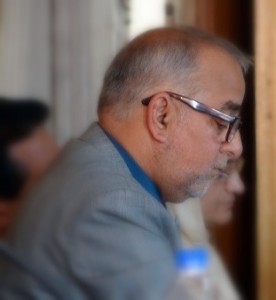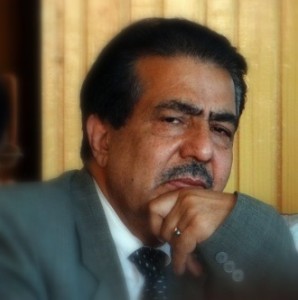Peace Watch » Kashmir-Talk » Indus Water Treaty and Kashmir Interests
Indus Water Treaty and Kashmir Interests
Violating natural justice
…J&K hullabaloo is crying over spilt milk
DR. JAVID IQBAL
 Indus Water Treaty [IWT] violating natural justice was evident from day one of the treaty signed on September the 19th, 1960 in Karachi by Pundit Nehru and President Ayub Khan. It is Punjab centric to the detriment of J&K’s interests. Partition based on religious division had other factors–water head, irrigation head, and run of the river provision added to it. The rider put India in total control of all the western rivers in J&K [Jhelum, Chenab and Sind] in addition to eastern rivers in Punjab [Ravi, Beas and Sutlej]. Thus Indus basin became totality India’s handmaiden.
Indus Water Treaty [IWT] violating natural justice was evident from day one of the treaty signed on September the 19th, 1960 in Karachi by Pundit Nehru and President Ayub Khan. It is Punjab centric to the detriment of J&K’s interests. Partition based on religious division had other factors–water head, irrigation head, and run of the river provision added to it. The rider put India in total control of all the western rivers in J&K [Jhelum, Chenab and Sind] in addition to eastern rivers in Punjab [Ravi, Beas and Sutlej]. Thus Indus basin became totality India’s handmaiden.
The recent hullabaloo witnessed in J&K state cannot be captioned beyond calling it crying over spilt milk or repenting over stolen grain. MP Rajya Sabha from Kashmir Ratanpuri’s question on IWT in the recent parliamentary session got a stunning answer from Pawan Bansal, the union minister of water resources. “No state government” answered the minister “has ever requested the central government to renegotiate this Treaty or assess losses and compensate the state accordingly, ever since it was inked”. The state clearly failed to pursue July, 2011 recommendation of ‘State Finance Commission’ [SFC] implying that Jammu and Kashmir should seek compensation for the losses incurred by it on account of Indus Water Treaty [IWT] from not only India but Pakistan as well.
Mahmoud Rehman led three men SFC in its report pointed to IWT bottlenecks impeding growth and development of J&K State. Consequently it recommended that cost of shortfall be charged from signatories to the treaty and be estimated from September 1960 to August 2010. However as Bansal’s answer to Ratanpuri’s query indicates, the state government hasn’t done either. Perhaps it is out of the lurking feeling that interests of the state have been sidestepped time and again, hence the word heard so often is hardly followed by the desired deed in order to stay even with Delhi. It needs to be established whether ipso facto a demand of compensation could be made to Pakistan.
J&K is getting barely a share of .65 Million Acre Feet (MAF) out of water flow of 135.6 (MAF) in from Indus, Jhelum and Sutlej rivers flowing through or originating from the state. The state though is entitled to construction of water storage up to 3.5 MAF. JK leadership was not on board in 1960, when IWT was signed, none from either side of the dividing line—LOC. Conversely Punjabi leadership remained involved. In Pakistan it formed the very core of leadership. Indian Punjab being northern India’s granary had Pratap Singh Kairo’n pursuing his relentless drive to upgrade Punjabi economy. He was close to powers that be.
Indus Water Treaty does not meet the principles of natural justice. East/West tributaries should have had a need based division. That could have allowed J&K to realize its hydro-electrical potential, estimated to be about 20,000 MW and earn its fair share of revenue. ‘The revenue is estimated to fetch 70, 000 crores/annum, and as per recent estimates, it could be as high as 100,000 crores’ .The budget presented recently by Ab. Rahim Rather lays down a budgetary requirement of approximately 33,000 crores. Imagine what the state could be development-wise, if we would have had twice or thrice the money of budget estimates.
The equipoise between upper riparian and lower riparian areas of Indus basin is lacking. J&K state despite being upper riparian area is suffering. Natural justice demands that the treaty be re-negotiated and equipoise maintained between upper and lower riparian areas across the divide.
Much is made of state lacking in technology or financial resources. Even if it is taken as true, still why it should translate into energy drain. Oil rich Arab States do not have three essential elements…technology to explore new wells, extraction from the existent wells and refinement; still they remain flushed with their natural resource, get it cheap and remain financially resourceful. If that is true, as it in indeed an irrefutable fact, why shouldn’t JK have a similar arrangement…any answers please?
Yaar Zinda, Sohbat Baqi [Reunion is subordinate to survival]
Feedback on: iqbal.javid46@gmail.com
The question of compensation
In response to an article by Dr. Javaid Iqbal
FEEDBACK
ABDUL MAJID ZARGAR
Smaller Default Larger
The Indus water treaty (IWT) is once again in discussion. A demand often being raised is that J&K should claim compensation from Pakistan (as also India) on account of losses suffered by it due to Treaty. In his article “IWT-Violating natural justice” (Greater Kashmir-15th June), the highly acclaimed columnist , Dr. Javaid Iqbal has raised the question of compensation from Pakistan, but to the dismay of his readers, has left it unanswered.
Dr. Javaid Iqbal has raised the question of compensation from Pakistan, but to the dismay of his readers, has left it unanswered.
As rightly pointed out by the columnist, the question of compensation from Pakistan was also recommended by State Finance Commission(SFC) led By Mehmood-ul-Rehman in its report submitted to State Govt. in the preceding year. In making such a recommendation, SFC has betrayed a less –than-poor or a pedestrian knowledge of the whole gamut of IWT. To understand this we will have to revisit the historical facts & international law on the subject.
After partition of the sub continent into two independent sovereign countries India & Pakistan, the water resources of British India were divided between the two nation states first by virtue of an Inter Dominion Agreement in 1948 and finally by virtue of Indus Water treaty signed on September 19, 1960 in Karachi This treaty which gave near exclusive rights of waters of three rivers Ravi Sutlej & Beas to India and Chenab, Jhelum & Indus to Pakistan was brokered by the World Bank.
Let us pause a bit & see what were the conditions prevailing & options available to the two Countries at that point of time. J&K was an internationally disputed affair between India & Pakistan and ruled by an illegitimate & un representative Government having come into existence because of rigged elections & machinations of Delhi. Pakistan was a lower riparian state and it had certain rights to use of water flowing into it from all the six rivers Ravi, Sutlej, Beas, Chenab, Jhelum & Indus under international law. Contrary to all international norms, India had stopped water flow to Pakistan in 1948 which caused great damage to its crops and compelled it to first enter into a inter-dominion agreement & later into sustained dialogue culminating in IWT.
If principles of natural justice & good behavior were to be followed, India should have allowed Pakistan to use waters of Ravi Sutlej & Beas instead of three disputed rivers of J&K. Alternatively, even if the dispute angle was ignored, It could have allotted two rivers out of its own three to Pakistan & one out of Kashmir or at least minimum one out of its own three & two out of J&K rivers. But no – sheer Indian dishonesty was in full play here. It allotted all the three disputed J&K rivers to Pakistan. The underlying desire being to retain assets & resources with clear title & those with disputed ones to go to Pakistan. Unfortunately there was no body of Gandhi’s stature left in India to protest at this grave injustice to both Kashmir & Pakistan. J&K State was not even consulted though water resource was a state subject. There was also none in Kashmir to protest. Even Abdullah in prison, who would often write letters of protest from jail on political matters concerning him personally, did not raise any voice.
This takes us to the next question which is whether J&K should claim or is entitled to claim compensation of loss from Pakistan due to IWT. The answer to this would depend on whether Pakistan did get any undue or extra benefit from IWT. No doubt Pakistan is getting water from JK rivers but that is out of an international treaty allocating common assets between the two Separating countries & no country pays for using those assets which have come to its share out of a division by metes & bounds. Were Pakistan liable to pay for this use, India would have billed it since inception & pocketed the money? There should be no doubt about it. Looking from another angle, Pakistan has already paid adequate consideration for using JK river waters in the form of its forfeiture of rights over Ravi, Sutlej & Beas and nothing more is payable by it.
As far as compensation to J&K is concerned, it is only India which is liable. The simple reason being that it is India which used our waters to fulfill its own obligation towards Pakistan.
It saved Ravi, Sutlej & Beas from flowing to Pakistan and that is where it has to compensate Jammu & Kashmir. And those who still insist that Pakistan should pay are, I am afraid, indulging in a misdirected discourse.
Filed under: Kashmir-Talk








Reading the above I feel like Kashmir is colonized by GOI. Our so called leaders have sold Kashmir resources for their petty gains.